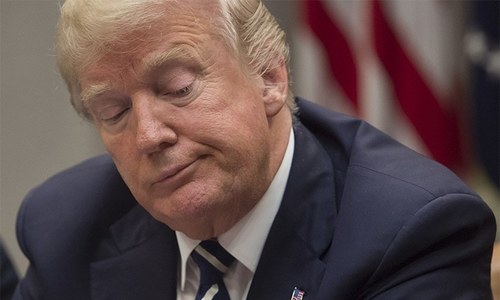JERUSALEM: Tens of thousands of Palestinians are no longer getting food aid or basic health services from America, US-funded infrastructure projects have been halted, and an innovative peace-building programme in Jerusalem is scaling back its activities.
The Trump administration’s decision last year to cut more than $200 million in development aid to the Palestinians is forcing NGOs to slash programmes and lay off staff as the effects ripple through a community that has spent more than two decades promoting peace in the Middle East.
The US government’s development agency, USAID, has provided more than $5.5 billion to the Palestinians since 1994 for infrastructure, health, education, governance and humanitarian aid programmes, all intended to underpin the eventual creation of an independent state.
Much of that aid is channelled through international NGOs, which were abruptly informed of the cuts last summer and have been scrambling to keep their programmes alive.
President Donald Trump says the USAID cuts are aimed at pressuring the Palestinians to return to peace talks, but Palestinian officials say the move has further poisoned relations after the US recognised Jerusalem as Israel’s capital last year. The aid groups, many of which have little or no connection to the Palestinian Authority, say the cuts hurt the most vulnerable Palestinians and those most committed to peace with Israel.
“If you want to maintain the idea of the peace process, you have to maintain the people who would be part of the peace process,” said Lana Abu Hijleh, the local director for Global Communities, an international NGO active in the Palestinian territories since 1995.
Before the aid cuts were announced, it provided food aid branded as a gift from the American people to more than 180,000 Palestinians in the Israeli-occupied West Bank and Gaza on behalf of the World Food Programme. USAID had planned to contribute $19 million a year for the next five years to continue the project but pulled out in August.
Global Communities can now only provide aid to 90,000 people through March, and Abu Hijleh had to lay off around 30 staff, including in Gaza, where unemployment exceeds 50 per cent. “It really hurts, because you’re talking about the most basic level of assistance,” she said. The average family receives a monthly voucher worth around $130.
Funding has also been cut for a five-year, $50 million programme run by a coalition of NGOs to provide health services, including clinical breast cancer treatment for some 16,000 women and treatment for some 700 children suffering from chronic diseases.
Infrastructure projects, including desperately needed water treatment facilities in the blockaded Gaza Strip, have also been put on hold. Anera, which has carried out development projects in the Middle East for more than 50 years, said it was forced to halt five infrastructure projects in the West Bank and Gaza before completion and cancel three more in Gaza that were pending funding approval. It says the projects would have benefited more than 100,000 people.
The NGOs are reaching out to other donors, but USAID is one of the biggest sources of funding for a global aid community overwhelmed by conflicts in Syria, Yemen and elsewhere.
The Trump administration has also cut off funding for peace-building initiatives involving Palestinians even residents of east Jerusalem, which Israel considers to be part of its capital. Kids4Peace, a group founded by Israeli and Palestinian families in Jerusalem in 2002, brings Jewish, Christian and Muslim teenagers together for seminars and summer camps where they can share their experiences and learn more about one another.
The group’s organisers acknowledge the longstanding criticism of such initiatives that campfires and singalongs won’t bring peace to the Middle East, especially after a decade of diplomatic paralysis and little hope for resuming meaningful negotiations. But they say that with a $1.5 million USAID grant in 2016 they tripled the number of annual participants to around 70 and revamped programmes.
Participants now take part in a Youth Action Programme in which they plan and execute projects in their communities. One group is campaigning for Arabic subtitles in Jerusalem cinemas. Another set up a community garden in a tense neighbourhood where Jews and Arabs had rarely interacted.
Kids4Peace was a finalist for another $1.5 million grant this year, but that has been indefinitely postponed because of the funding cuts. It will continue to run programmes with the help of private donors, but its growth prospects are in doubt.
“We see the trend lines moving in a negative direction, in terms of more hostile attitudes towards the other, less interaction between Israelis and Palestinians, more resistance to peace negotiations,” said Josh Thomas, executive director of Kids4Peace International.
Critics of the policy fear that cutting off aid will further diminish Washington’s ability to manage a conflict that remains highly combustible. “When America vacates the Middle East space, we do so at our own risk and we do it to the benefit of our adversaries,” said Dave Harden, a former USAID mission director in the West Bank and Gaza.
Published in Dawn, January 23rd, 2019















































